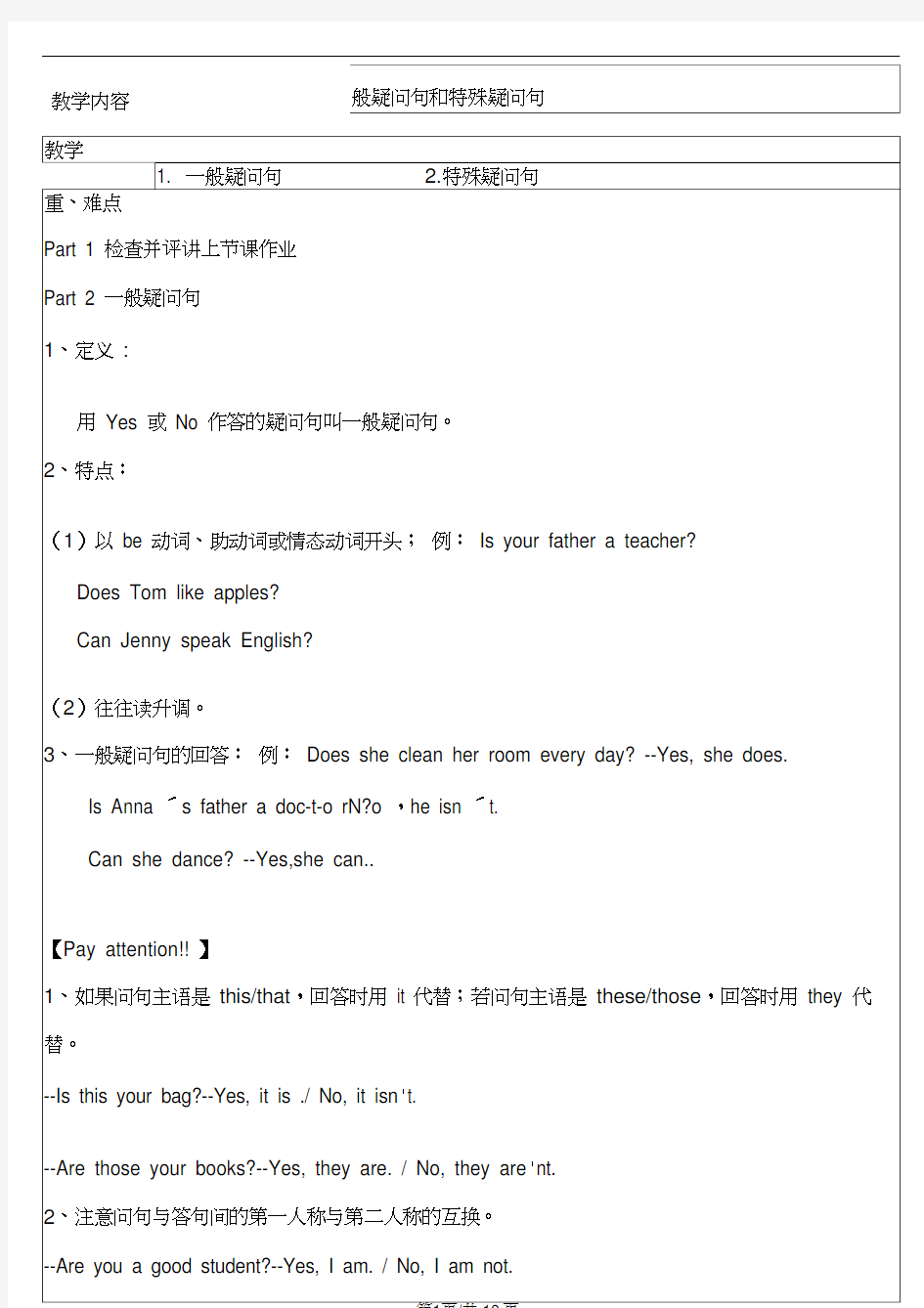六年级下册英语教案一般疑问句和特殊疑问句人教


教学内容
--Can I open the door?--Yes, you can. / No, you ca'nt.
3、如是同样表达“一些”,注意some用在肯定句而any 用在疑否句。
--Are there any apples on the table?--Yes, there are.
I have some new books.
【堂上练习】
一、按要求完成句子。
1. _________________________________________________________ C an you play chess?作(肯定回答)____________________________________________
2. _____________________________________________________________ He can do the dishes.改(为一般疑问句) _______________________________________
3. __________________________________________________________ C an you set the table?作(否定回答)________________________________________
4. _________________________________________________________ T here is a big closet.改(为否定句)____________________________________________
5. _______________________________________________________________ There are blue curtains.改(为一般疑问句) ____________________________________
6.Is this your bedroom?(作肯定回答) ___________________________
7.Is it a Walkman?(作否定回答) ___________________________
8.Is there a lake?作(否定回答)_________________________
9. There are some buildings in our school.(改为一般疑问句)
10. There are some tall buildings in the city.(改为一般疑问句)
11. _____________________________________________________ Are there any flowers?(改为肯定句)__________________________________________
12. ______________________________________ There are some footballs in the classroom.(改为否定句) ________________________
13.Is that your new computer?作(肯定回答)_________________
14.Is she a dancer?作(否定回答) __________________________
15.Can you give me a ruler?作(肯定回答) ___________________
二、连词成句。
1. ___________________________________________ mother, she, is, your?
2. ___________________________________________ he, is, brother, your?
3. ___________________________________________ you, do, apples, like?
4.it, is, in, box, your? __________________________
5.go, I, can, outside, now? __________________________
Part 3 常见的特殊疑问词
特殊疑问句:回答不是“是yes”或者“否no”的问句,而是根据提问的内容,具体回答,即问啥答啥。
☆特殊疑问句= 疑问词+ 一般疑问句常见的特殊疑问词及其用法
肯定句变为特殊疑问句(就划线部分提问)的步骤第一步:先变一般疑问句第二步:找合适的特殊疑问词代替划线部分第三步:特殊疑问词提前放到句首,并大写,其余按顺序照抄,省略划线部分。例如:This is a book.
第一步:变一般疑问句Is this a book?第二步:找合适的特殊疑问词Is this what ? 第三步:特殊疑问词提前放到句首,并大写,其余按顺序照抄,省略划线部分。What is this? 注意:原句中是第一人称I/my ,变疑问句时转换成第二人称you/your 。注意:原句中是第一人称I/my ,变疑问句时转换成第二人称you/your 。
一、用适当的疑问词填空。
1. ____ is that pretty girl? She is my sister.
2. ____ are Jack and Tom? They are behind you.
3. ____ do you go to school? I go to school from Monday to Friday.
4. ____ has a beautiful flower? John has a beautiful flower.
5. ____ are they? They are my parents.
6. ____ is my mother? She is in the living room.
7. ____ are you going? We are going to the bakery面(包坊).
8. ____ do Jim and Wendy play ball? They play ball in the afternoon.
9. ____ does he jog? He jogs in the park.
10. __ are you from? I'm from Changchun city.
11. _________ A: is the boy in blue? B: He' s Mike.
12. _________ A: wallet is it? B: It ' s mine.
13. A: is the diary? B: It ' s under the chair.
14. A: ______ is the Christmas Day? B: It ' s on th t e h 2o5f December.
15. _________ A: are the earphones? B: They are 25 yuan.
一,用 what time, what color, what day, what 填空。
1. A: _____ ______ was yesterday 昨( 天)? B: Yesterday was Sunday.
2. A: _____ ______ do you like? B: I like red.
3. A: _____ is this? This is a computer 电( 脑 ).
4. A: _____ are you doing? B: We are playing basketball.
5. A: _____ does your mother do? B: My mother is a policewoman.
6. A: _____ are those? B: Those are pepper 辣s (椒 ).
7. A: _____ is in the box? B: A lovely doll is in the box.
8. A: _____ is on the table? B: The apple is on the table.
9. A: _____ is in the classroom? The blackboard is in the classroom.
10. A: _____ _____ _____ ? B: Mary is hungry.
11. A: _____ _____ _____ _____ _____ ? B: My favorite color is pink.
12. _______ A: ____ _____ _____ ? B: Nick is playing table tennis.
二,对画线部分提问(把各句变为特殊疑问句)
1. I am Tom. _______________________ ?
2. She is my teacher. _________________________ ?
3. He is Lily ' fa s ther. ____________________ ?
4. Her model plane is on my tape. _____________________________________
?
5. Helen ' f s ather is in the library. ___________________________________ ?
16. ________ A: is the hairdryer?
17. ________ A: is it today? 18. ________ A: was it yesterday? 19. ________ A: this red one? 20. ________ A: is it from here? B:I t ' s bl.u e B: It ' s Sunday.
B: It was the 13th of October.
B:I t ' s beautiful.
B: It ' s about two kilometer away.
6. Mary' s grandparents are in the library. _____________________________ ?
7. My name is Lily. ____________________________ ?
8. ______________________________________ This is a blue radio. ?
9. The girl is Gina. ____________________ ?
10. Those are red bags. _________________________________ ?
三,连词成句
1. Hippopotomonstrosesquippedaliophobia(上学)恐惧症Hippopotomonstrosesquippedaliophobia is the fear of long word。s 这个长长长长长长??的单词意为:对长单词的恐惧??,
2. Underground
Underground is the only English word that begins and ends with the letters "und." underground(地下的)是唯一一个以und开头又以und 结尾的英语单词。
3. 大写China 指“中国”;小写china指“瓷器”。
大写Japan指“日本”;小写japan指“日本式漆器”。大写John指“约翰”;小写john 指“厕所”。
死记硬背是一种传统的教学方式,在我国有悠久的历史。但随着素质教育的开展,死记硬背被作为一种僵化的、阻碍学生能力发展的教学方式,渐渐为人们所摒弃;而另一方面,老师们又为提高学生的语文素养煞费苦心。其实,只要应用得当, “死记硬背”与提高学生素质并不矛盾。相反,它恰是提高学生语文水平的重要前提和基础。大写Russia 指“俄罗斯”;小写russia指“俄罗斯皮革”。大写Turkey 指“土耳其”;小写turkey 指“火鸡”。
作业布置
二、要练说,得练听。听是说的前提,听得准确,才有条件正确模仿,才能不断地掌握高一级水平的语言。我在教学中,注意听说结合,训练幼儿听的能力,课堂上,我特别重视教师的语言,我对
